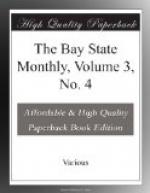The history of this parish has been remarkable for the long terms of service of its ministers. During the two hundred and fifty years of its existence it has had but eight ministers, of whom the eighth and the present one is the Rev. H. Price Collier. The denomination is Unitarian. Originally a Puritan church, it was liberalized under the sixty-nine years’ ministry of Rev. Ebenezer Gay, D.D., extending from 1718 to 1787. Of this able divine many interesting anecdotes are told. He was a powerful leader of religious thought, who “sounded almost the first evangel of that more liberal faith which found its highest expression in Channing, and its fruit in the absolute religious freedom of to-day. Well may the Commonwealth cherish this church in high and in sacred esteem, which, through two such men as Peter Hobart and Ebenezer Gay, has put, in the spirit of the highest independence, its mark upon the tablets of civil liberty and of religious thought.”
The second parish (Unitarian) at South Hingham was set off March 25, 1745. Its first minister was Rev. Daniel Shute, D.D., a man of great ability and practical sense, who was an earnest advocate of his country’s cause during the revolutionary war. He was a member of the convention which formed the constitution of Massachusetts, and of that which adopted the constitution of the United States.
The Third Congregational Society (Unitarian) was organized in 1807. There is also within the town a religious society of each of the following denominations, viz.: Evangelical Congregational, Baptist, Methodist Episcopal, Universalist, Protestant Episcopal, Second Advent, and Roman Catholic. It would seem as if there need be no hungering for the “bread of life.”
The military record of Hingham is worthy of notice.
In Philip’s war, in 1675, it appears that “souldiers were impressed into the country service,” and provision was made by the selectmen for their expenses.
In 1690 “Capt. Thomas Andrews and soldiers met on board ship to go to Canada” in the expedition under command of Sir William Phips. Capt. Andrews and most of the soldiers belonging to Hingham died in the expedition.
In the French and Indian wars many Hingham citizens enlisted, and Capt. Joshua Barker was in the expedition to the West Indies in 1740, and in the wars of later years.
In the war of the Revolution there was no lack of patriotism in Hingham, “The records indicate that nowhere did patriotism put forth in a greater degree the fulness of its efforts and the energy of its whole soul and spirit.”




